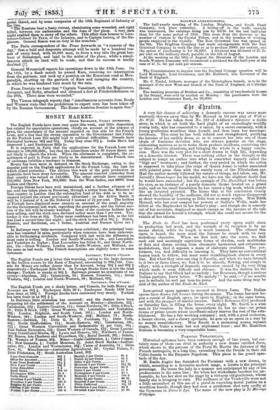(Of Oratrtm.
A very fair chance of achieving a dramatic success was never more wantonly thrown away than by Mr. Heraud in his new play of Wiji or No Wife. He has taken from No. 322 of Addison's Spectator a feeble story, in which is set forth the hard plight of an exceedingly worldly young lady, w)io has consented to a union, by a secret ceremony, with-a young gentleman wealthier than herself, and then loses her marriage- certificate. This story he has both refined and strengthened, purifying the heroine of her earthly dross, so as to convert her into one of those ideals of feminine devotion who are always popular on the stage, elaborating motives so as to make them produce incidents, contriving two or three effective situations, and bringing the whole to a happy conclu- sion. Here was the very plot for a short drama in high life, depending on a domestic interest. There was nothing either in the thought or the subject to tempt an author into what is somewhat- vaguely called the "high art" treatment ; and further, the very period in which the action is supposed to take place (the reign of Queen Anne) is rather associated with pointed prose than with the stately verse of the Elizabethan age. Had the author merely followed the nature of things, andlaken, say, Mr. Jerrold's Housekeeper for his model,, we have not the slightest doubt that he would have succeeded ; but the example of The Hunchback was before his eyes, as an instance of a purely domestic theme treated on a grand' scale, and on his small foundation he has raised a big work, which stands like an inverted pyramid. The hisses that at the conclusion clearly showed the hostility of the audience, did not so much express disapproval as sheer weariness at learning so little from so many words. Miss Edith Heraud, who last year essayed her powers at Sadler's Wells, made her debilt at the Haymarket in her father's play ; and though she is scarcely out of her noviciate, displayed so much energy as the heroine of the tale that she earned for herself a triumph, which she could not secure for the vehicle of her talents.


























 Previous page
Previous page